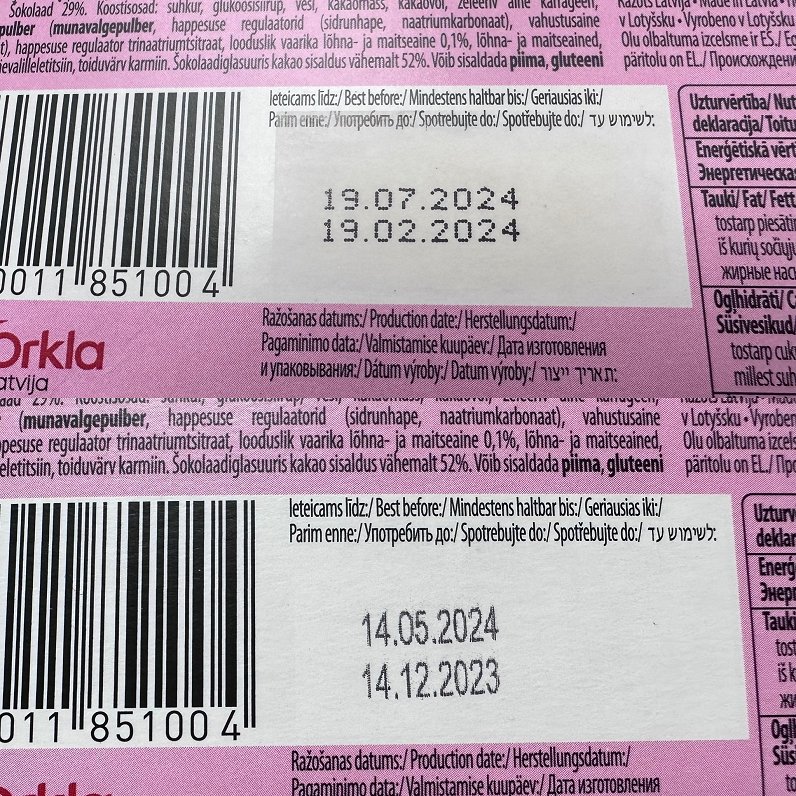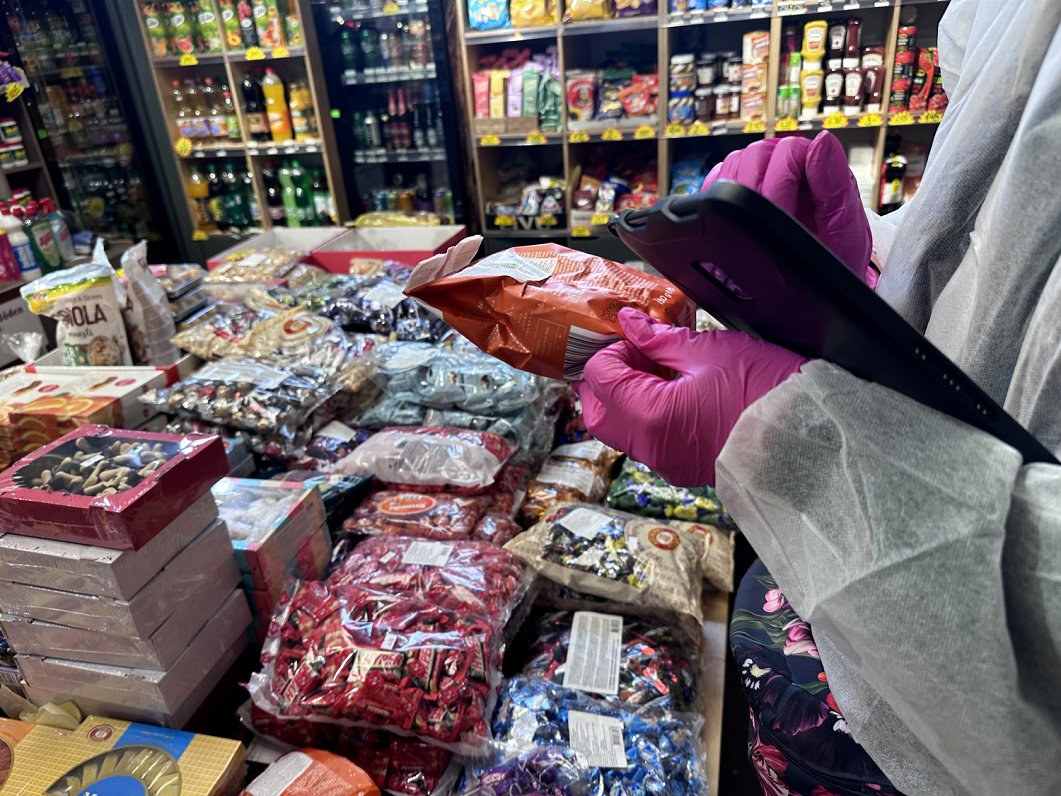There are around ten small stores in the Central Market notable for selling candy, chocolates, tea, and some other products at extremely low prices. How is this possible in the cut-throat world of retail? By selling products that are past their expiry dates, contrary to trading laws.
The stores belong to two companies, SIA "Senāls" and SIA "Fildaros". Both have a similar range of products - canned goods, candies, oils, drinks, teas, coffee and more.
In the kiosks of both companies in the Central Market, Latvian Radio's reporter bought several products, like nuts, chocolate, or gingerbread. It immediately looked like the expiration dates may be bogus. For example, one candy box seemed to have its original expiration date beneath a matte coating. The producer of the candy, the major company SIA "Orkla Latvija" was consulted and confirmed that the dates had been tampered with. Moreover, record checks showed the products in question were not actually produced on the dates stated and that there were other giveaways to show manipulation – for example the use of incorrect fonts.

The fake deadlines beg the question - where do these food items come from?
Laura Bagātā, communications manager of SIA "Orkla Latvija" told Latvian Radio the findings came as a surprise, but confirmed that the specific companies in the Central Market are indeed Orkla's customers.
"We didn't have any, so to say, suspicions or information that such a commercial practice is being used... There is no doubt about it, we will ask for explanations from the entrepreneurs themselves, why this practice exists."
She said that both companies violate the principles of cooperation stipulated in their contracts.
"We trust that our products will be delivered to the points of sale appropriately, maintained appropriately, stored appropriately so that would not see a reduction in [our reputation for] quality."
"If these products, for example, are stored for a very disproportionately long time, say past the expiry date,
they are simply no longer safe for human consumption, hence the risk," Bagātā confirmed.
Jānis Ašaks, a representative of JSC "Jungent Latvia", which makes another one of the gingerbread products bought at the Central Market, also confirmed that the dates on it could not be real.
"We confirm that the validity period has been changed in the pictures you sent us. The original deadline was erased and another super-imposed on top. These products were not sold to the companies "Fildaros" or "Senal" from "Jungent Latvia". It is very difficult to determine where these companies purchased the products in the picture and at what price."
Inspection time
Latvian Radio's reporter accompanied inspectors of the Food and Veterinary Service (PVD) on their rounds at the Central Market.
Inspectors Karīna Ruse and Iveta Dervina agreed to check the outlets in question. Karīna Ruse explained: "We will check the validity, we will observe deadlines and markings, as well as storage conditions." The inspectors have electronic tablets with them, on which they record information.
Inspector Iveta Dervina says that noticing that the expiration date on the product's packaging has been changed is very difficult: "Sometimes we even use a magnifying glass."
At the very beginning of the inspection, the inspectors find several goods that are missing labels in the Latvian language – a basic legal requirement. Printed labels with information in Latvian are often placed on the shelves next to the products instead. They are very similar in shape and size to those previously used with the fake expiration dates on the label, for example, for tea.
Asked by Latvian Radio if and how expiration dates were changed, the seller denied this took place. In general, the impression given by Latvian Radio's report was that the inspection procedures were not particularly slick.
Intars Saušs, head of the Food Distribution Monitoring Sector of the Riga City Administration admitted that "you can say that in 2019, 2020, there were big problems" with the companies in question and that there had even been raids on premises.
PVD statistics show that over the past five years, 12 inspections have taken place at "Senal" and 29 at "Fildaros". The company "Solovs", which is closely related to both companies, has had fines of about five thousand euros applied and 600 kilograms of goods were seized during inspections of foodstuffs with signs of falsification of expiration dates.
Naturally, Latvian Radio's reporter tried to contact the companies directly. This proved extremely challenging. People outside the joint companies' warehouse denied knowledge. Company telephone numbers appeared either to be incorrect or disconnected. They maintain no internet website with contact details. Eventually, Latvian Radio obtained the numbers of the company owners and called.
The first, Sergey Filipov, answered in Russian and then immediately hung up when a question was asked. The second person, Olga Afanasyeva, never answered attempts to contact her.
Out-of-date attitudes?
Henriks Danusevičs, president of the Latvian Traders Association says: "In my opinion, if there are multiple criminal transactions, then it is necessary to contact the police and stop such activity. And such companies should be liquidated or officials [should] be made responsible. The question here is that you need to take the initiative."
According to him, by continuing to tolerate such traders, "Rīgas Nami" which is responsible for operations on the central market territory has "acted irresponsibly towards society and the Rīga City Council."
Dace Preisa, public relations manager of SIA "Rīgas Nami" told Latvian Radio that no complaints had been received in recent years about the companies in question and that the landlord has no information about penalties applied to its lessees by PVD. During the last two years, about 40 annual inspections were carried out on a random basis in these companies and no fakes were detected.
"We don't have expertise in the authenticity of the marking.[..] None of our specialists is entitled or is
competent to assess this potential forgery." So inspections happened – but it is likely inspectors couldn't have detected forgeries even if they were there.
Preisa said that the landlord tries to "nurture" companies rather than punish them and that unless a tenant company has tax arrears, "Rīgas Nami" has no right to turn them away. However, information available in the public business register shows that "Fildaros" has a tax debt of 11,000 euros and "Senal" of 7,000 euros.
How does "Rīgas Nami" assess the marketing of food products with a fake expiry date? Is it compatible with a continued lease agreement?
Dace Preisa said: "If we have evidence that we can talk about that this company is engaged in unfair commercial practices, I would say no, because as I said it is important we have a very good market reputation."
In the meantime, consumers can continue to freely buy low-priced food products with fake expiry dates at the Central Market – and it is more likely that the original producer who manufactured the product in good faith will be held responsible than a retailer who wilfully misleads customers – among them the thousands of foreign tourists making a beeline for the Zeppelin hangars.






















